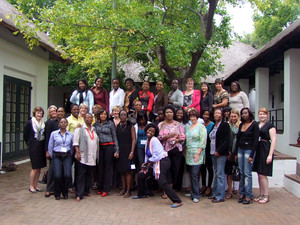By Jessica White
Imelda is just one of many successful participants in WAN-IFRA’s Women In News (WIN) programme to have made a career move or been promoted since the programme’s launch in Botswana, Namibia and Zambia in 2010.
As the world prepares to celebrate International Women’s Day on 8 March, media professionals will again congregating in Botswana, Namibia and Zambia to launch this year’s WIN activities. Working with newspapers and their high-potential female employees to overcome gender gaps in management and senior editorial positions, in 2014 the successful initiative will also expand to three additional countries: Malawi, South Africa and Zimbabwe.
The 2014 WIN programme is inviting 60 women media professionals from 30 media companies to participate in comprehensive skills development, career coaching, mentoring and networking in their national markets. The group will then reunite in Johannesburg, South Africa in August for the regional WIN Summit.
This year also benefits from the added engagement of WAN-IFRA’s member association, Print and Digital Media South Africa, representing more than 700 newspaper and magazine titles from the country’s leading publishers. The project will also be conducted with the South African National Editors’ Forum (SANEF) whose members include editors, senior journalists and journalism trainers from all areas of the South African media. WIN South Africa will offer certification to participants through collaboration with Wits University Department of Journalism, a first for WAN-IFRA’s media development programmes.
While studies show that a higher representation of women in decision-making positions in media leads not only to better coverage of women in the news, but can also produce better financial results, gender inequalities continue to constrain this potential.
Women face added difficulties in reaching higher levels of responsibility and managing demanding time commitments at work with family obligations: “I must admit it is not easy to strike a fair balance,” concedes Imelda.
However, women’s career progressions observed through the WIN programme show promise for increasing women’s involvement in leadership roles. On a personal level, former WIN-graduate Phemelo Ramasu from Botswana notes how she was able to gain confidence in tackling sensitive issues: “I have moved from being a timid intern who was so terrified of the newspaper environment to a reporter who stands her ground.”
Imelda Libanga has in turn observed positive changes within her own media organisation in Zambia: “I must commend the Daily Mail for increasing the number of women in positions of authority in the past two years. Though we have not arrived yet, I believe this is a step in the right direction,” she adds.
To further address wide-ranging gender inequalities in media, WAN-IFRA will launch the Alliance for Women In News, a working committee that partners with media houses to collectively help widen the opportunities for management and executive roles for their women employees through education, training and awareness-raising.
More than 20 news media companies and 50 high potential women have so far benefited directly from the WIN programme, which is conducted under a strategic partnership to advance media development and press freedom worldwide between WAN-IFRA and the Swedish International Development Cooperation Agency (Sida).
More information at www.wan-ifra.org/node/67741/



